Key Insights
- 0x’s API consumption volume increased 40% QoQ, growing to $3.7 billion in Q4.
- 0x daily application integrations grew 16% QoQ and 86% YoY, reaching a daily active average of 93 — its highest level in the past year.
- 0x’s daily average unique traders grew by 41% YoY to nearly 15,000, despite falling 17% QoQ.
- 0x achieved a rate of failed transactions (revert rate) of only 4%, its lowest in the past year and the lowest in the industry.
- 0x opened beta access to Tx Relay API, allowing developers to embed gasless trading and MEV protection into their apps on Ethereum and Polygon. 0x’s key partners include Coinbase Wallet and Robinhood.
Primer
0x is an integrated suite of decentralized finance (DeFi) infrastructure APIs that enables developers and teams to build financial products on crypto rails. Through the 0x APIs (offchain routing) and the 0x Protocol (onchain settlement via an open-source protocol), 0x connects Makers and Takers to facilitate the trading of digital assets. While Takers demand liquidity of digital assets on 0x, Makers are the parties that supply that liquidity. Onchain makers include AMMs and DEXs, while offchain makers are professional market makers that provide RFQ (Request-for-Quote) liquidity to 0x.
0x’s flagship product, Swap API, enables developers to deliver the best-executed price to users directly in their applications. It does this by aggregating liquidity from 100+ sources, including decentralized exchanges (DEXs) and private market makers through the 0x RFQ, and its proprietary smart order routing. The best-executed price is different from the quoted price in that it is the best rate when the trade is realized, as opposed to the quoted rate subject to price slippage. Swap API is available on nine EVM-compatible blockchains, including Ethereum, BNB Smart Chain (BSC), Polygon, Avalanche, Optimism, Fantom, Celo, Arbitrum, and Base.
The 0x platform also includes the 0x Dashboard, a developer experience tool with instant API keys, analytics, and monetization controls; Tx Relay API, which enables developers to enhance user experience to reduce drop-offs in the trading process (currently in beta on Ethereum and Polygon); and Orderbook API, which enables developers to add limit orders to their DeFi applications (available on Ethereum, Polygon, and BSC). 0x’s products have been powering the backend processes for DeFi since it launched in 2017.
Website / X (Twitter) / Discord
Key Metrics
Performance Analysis
Volume and Trades
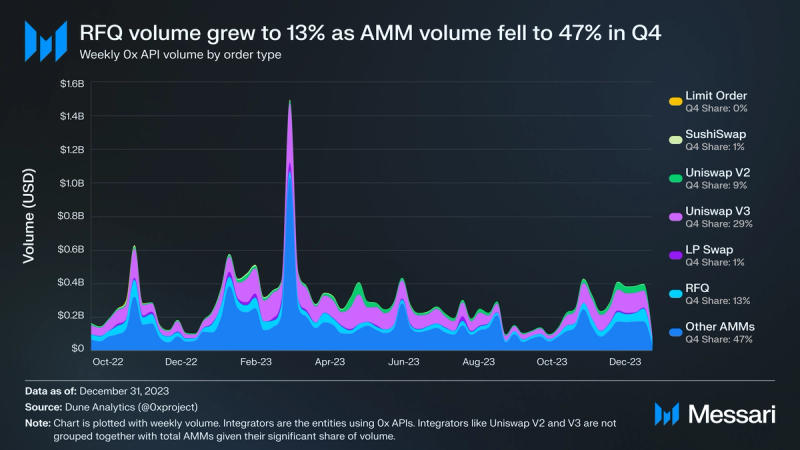
0x API volume increased by 40% QoQ, from $2.7 billion to $3.7 billion. This growth coincided with 0x adding support for notable liquidity sources like Camelot (one of Arbitrum’s largest liquidity sources) and PancakeSwap V3 (BNB Smart Chain’s highest-volume DEX). As far as growing volume share, RFQ trades and Uniswap trades saw the largest QoQ gains, increasing by 4% and 5%, respectively. RFQ trades will likely increase as a percentage of volume, as prices rebound from the turmoil of the past year and as users seek decentralized solutions to harmful MEV.
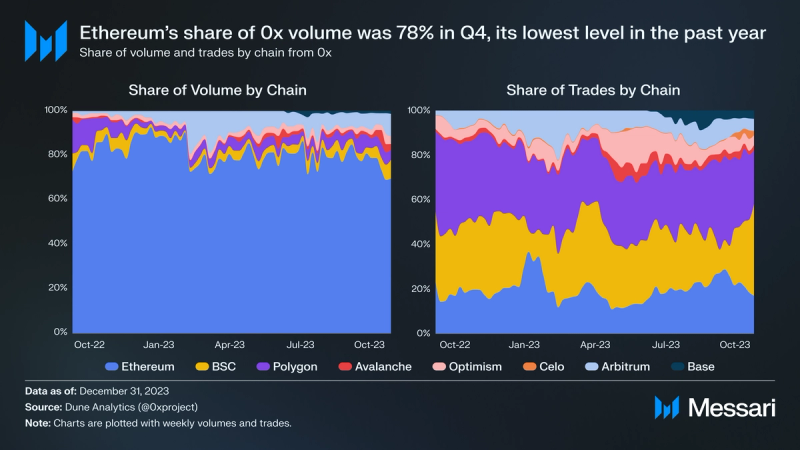
Ethereum’s share of 0x volume was 78% in Q4, its lowest level in the past year. Aside from this 3% drop, most other protocols remained relatively unchanged in terms of the share of volume processed. However, the relative share of trades continued to change. Ethereum recovered the losses of its trade share from the previous quarter, reaching 23% in Q4. Meanwhile, Polygon facilitated 32% of trades, while BSC accounted for 24%. Though Optimism had a strong Q3, accounting for 14% of trades, it dropped to 6% in Q4, while Arbitrum stayed at 7% and Base grew its share of trades to 5%. The distribution of 0x trade and volume share suggests that the largest-volume traders, outside of Ethereum, trade on Arbitrum.
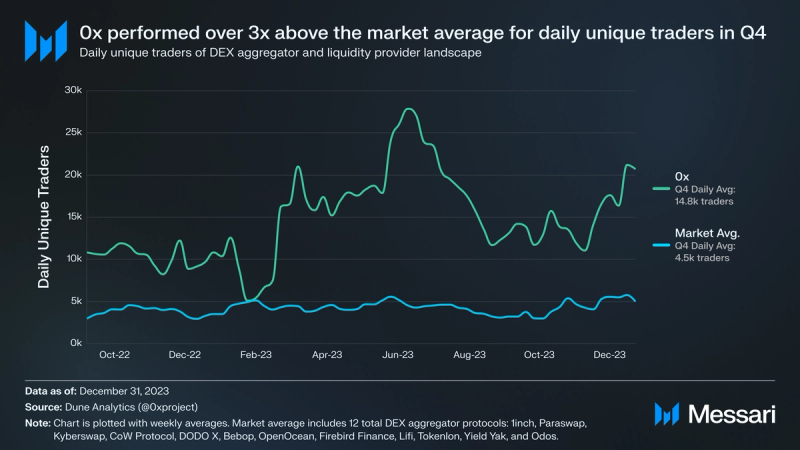
0x performed roughly 3x above the industry average (which includes 12 protocols) in terms of servicing daily unique traders in Q4, despite decreasing by 17% QoQ. In Q4, Coinbase launched gasless trading powered by 0x’s Tx Relay API for the Coinbase Wallet, and Portal launched a Developer Marketplace that uses 0x to power its swap feature. These integrations will likely enable 0x APIs to reach more users, potentially growing the number of daily unique traders in the future.
RFQ Trades
On 0x, offchain liquidity is sourced from professional market makers via the 0x Request-for-Quote (“RFQ”) system. The RFQ system enables traders to request real-time quotes from market makers. Using the RFQ system, traders can avoid slippage, mitigate the risk of MEV attacks, and ensure optimized trade execution. RFQ is best utilized on non-pegged pairs, including some of the most highly traded pairs such as USDC-WETH, USDT-WETH, USDC-WBTC, WBTC-WETH, and DAI-WETH.
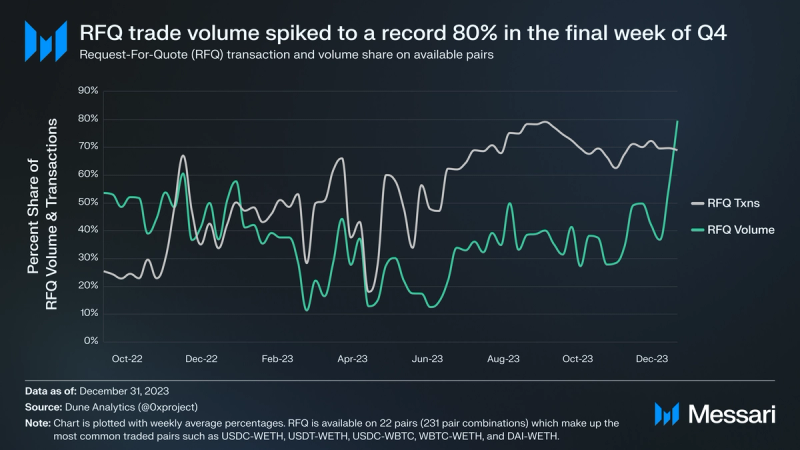
RFQ volume on available pairs grew 4% QoQ despite RFQ transactions falling by 2% QoQ. In the final week of the quarter, the volume of RFQ transactions spiked to a record of over 80% on two consecutive days. RFQ became dominant on pairs where it’s available, growing its share from 34% to 70% throughout the year. In terms of raw RFQ volume and transactions, Q4 saw increases of 111% and 30%, respectively. The growth may be a factor of increased usage of products implementing 0x APIs that offer this feature, such as Matcha’s Matcha Auto and Coinbase’s Coinbase Wallet.
Application Integrations
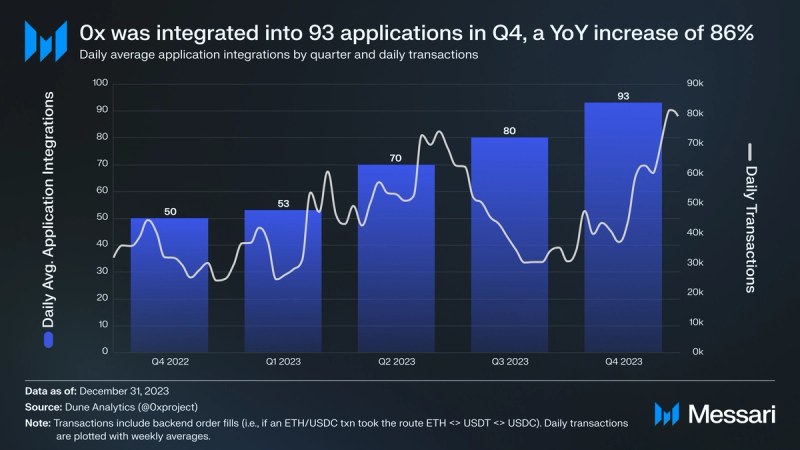
The number of applications using 0x increased for the fourth consecutive quarter, reaching a daily average of 93, up 16% QoQ and 86% YoY. As the market started to rebound in Q4, daily transactions increased by 6% QoQ. As of writing, Coinbase is the top application for driving the most trades through 0x APIs. In Q4, 0x was implemented into Portal’s Developer Marketplace, which focuses on offering third-party integrations for crypto-focused functionality through its SDK. The 0x implementation aims to make it easier for developers to add swap integrations into their applications. This partnership with Portal may lead to increased application integrations and transactions for 0x in the coming quarters.
Qualitative Analysis
0x had a productive Q4 as it shipped new developments for itself and Matcha, a DEX aggregator developed by 0x.
Developments and Integrations
- 0x opened beta access to the Tx Relay API, which enables builders to offer users gasless swaps. It also ensures protection from MEV, more reliable transactions, and smoother interactions by removing transaction approvals.
- Coinbase launched gasless trading to users in Coinbase Wallet on Ethereum and Polygon, powered by Tx Relay API.
- Portal launched its Developer Marketplace, which offers third-party integrations for crypto-focused features through its SDK, and used 0x to power its swap integrations.
- 0x updated its paid plans to offer more flexible and accessible options. This update to 0x’s paid plans increases the API accessibility for teams that don’t require swap functionality, enabling them to affordably retrieve price data.
- Increasing the liquidity sources on its Swap API, 0x added support for Camelot DEX (one of Arbitrum’s largest liquidity sources) and PancakeSwap V3 (BNB Smart Chain’s highest-volume DEX).
Matcha Developments
- Added liquidity support for Camelot DEX and PancakeSwap V3
- Added support for Phantom Wallet.
- Added a trade history feature that enables Matcha users to view their completed swaps and filled limit orders.
- Increased token coverage to over 5 million tokens.
- Launched cross-chain swaps available on seven chains.
- Implemented limit order updates that enhance usability.
Closing Summary
0x had a productive Q4. It opened up access to its Tx Relay API, added support for high-quality liquidity sources, and implemented a series of updates on Matcha. Throughout the quarter, 0x also experienced a 40% increase in volume, a 16% growth in application integrations, and the lowest rate of failed trades (reverts) at only 4%. And, throughout the past year, unique traders grew by 133%, and the share of RFQ transactions more than doubled. If 0x continues adding notable integrations (like Coinbase Wallet and Portal’s Developer Marketplace in Q4) and improving its own products, it will be primed to capture value in the next stage of the market cycle.
——



















